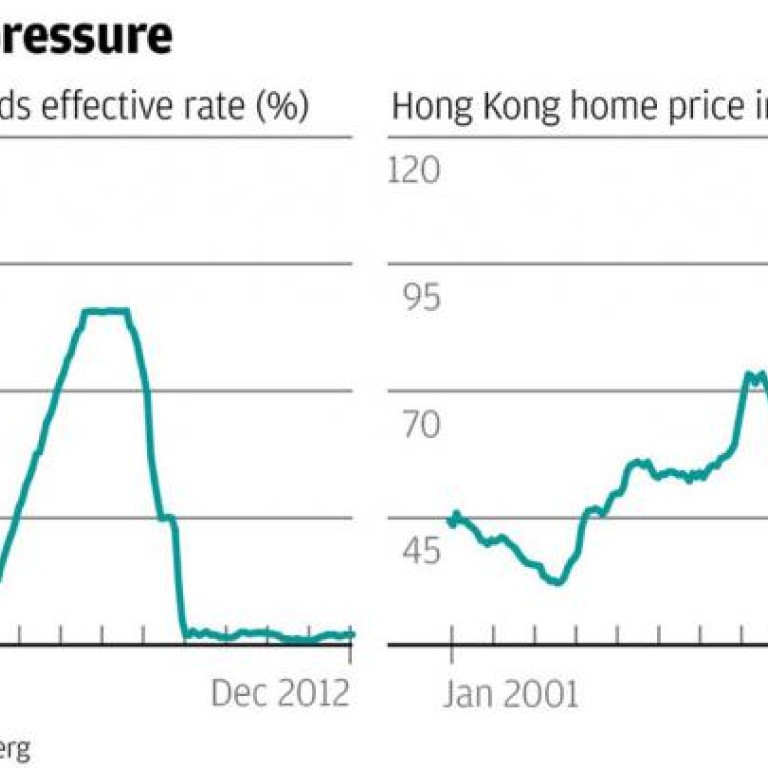
Fed's zero interest rate hurts Asia and may not help the US
Federal Reserve's rock-bottom approach feeds inflation in developing countries – and might even prolong the downturn in America
Speaking in Hong Kong this week, Charles Evans, head of the Federal Reserve Bank of Chicago, reiterated the Fed's pledge to keep US interest rates at rock-bottom levels for the medium term.
With US inflation set to remain below 2.5 per cent, the Fed's benchmark rate will remain at zero until economic recovery is well entrenched and the unemployment rate falls below 6.5 per cent.
With US unemployment currently at 7.8 per cent, that implied interest rates were likely to remain at zero until at least the middle of 2015, Evans said.
For Hong Kong, with its currency peg to the US dollar, that means another two years of ultra-low mortgage rates exerting upward pressure on local home prices.
For much of the rest of Asia, it also means continued financial stresses. Over the past few years, hedge funds and other investors have taken advantage of the Fed's policy to borrow in US dollars and invest the money in emerging markets.
This carry trade has pushed regional currencies sharply higher and forced policymakers from developing countries to keep their own interest rates artificially low in an attempt to deter inflows of hot capital.
In turn, low interest rates have pumped up inflation across much of the developing world, with the price pressures showing up in commodity markets, especially in the form of higher food prices.
In China, the need to keep the differential between local and US interest rates as narrow as possible has held both deposit and lending rates down. That's eaten into savers' incomes, which have restrained consumption, and depressed borrowing costs, which have fuelled the investment boom. As a result, China's economy has become even more unbalanced.
In short, the Fed's zero-rate policy is having a clear negative impact across much of the developing world.
What is less obvious is that it is having a clear positive effect on the US economy.
The idea behind the policy is that the lower interest rates are held, the greater the opportunity for credit expansion, and so for economic recovery.
But not everyone agrees this formula works. According to Ronald MacKinnon at Stanford University in California, zero interest rates actually lead to a form of financial repression in which intermediation between savers and investors breaks down, hindering growth.
MacKinnon points out that with interest rates at zero, big banks, which sit on the bulk of deposits, have little incentive to lend in the interbank market to smaller, riskier institutions, which are the main lenders to small and medium-sized companies.
You can see this by looking at the balance sheet of the US banking system. Since October 2008, the volume of interbank lending has plunged by 75 per cent, with banks holding on to cash or buying low-risk Treasury debt instead.
"The US system of bank intermediation is essentially broken," argues MacKinnon, who blames the Fed's zero-interest-rate policy for starving small companies of credit and prolonging the downturn.
To escape its liquidity trap, restore financial intermediation and shake off economic stagnation, MacKinnon believes the Fed needs to raise its benchmark interest rate to around 2 per cent.
Whether that would help revitalise the US economy is debatable, but it would certainly wreak devastation in the Hong Kong property market.
A two percentage point rate rise would push the cost of servicing a typical Hong Kong mortgage up from just under half of the median household income to between 80 and 90 per cent, triggering a sharp fall in prices. Happily for Hong Kong's homeowners, MacKinnon's ideas are unlikely to gain much traction with the Fed's chiefs.
But for policymakers across Asia, that's a crying shame. Another two-and-a-half years of zero US rates is only going to make their job far more difficult.

